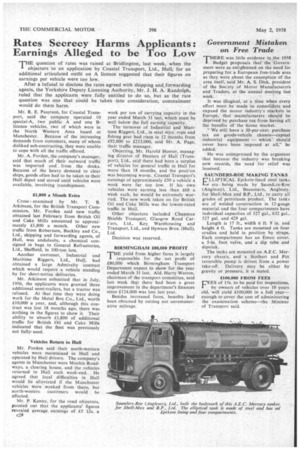Rates Secrecy Harms Applicants: Earnings Alleged to be Too Low
Page 72

If you've noticed an error in this article please click here to report it so we can fix it.
THE question of rates was raised at Bridlington, last week, when the objectors to an application by Coastal Transport, Ltd., Hull, for an additional articulated outfit on A licence suggested that their figures on earnings per vehicle were too low.
After a refusal to disclose the rates agreed with shipping and.forwarding agents, the Yorkshire Deputy Licensing Authority, Mr. J. H. A. Randolph, ruled that the applicants. were fully entitled to do so, but as the rate question was one that could be taken into consideration,' concealment would do them harm.
Mr. R. E. Paterson, for Coastal Transport, said the company operated 10 special-A, two public A and one Blicence vehicles, two of which were in the North Western Area based at Manchester. Because of the increasing demands from customers, many of whom disliked sub-contracting, they were unable to cope with all the traffic offered.
Mr. A. Forden, the company's manager,. said that much of their outward traffic was imported and . from the docks. Because of the heavy demand to clear ships, goods often had to be taken to their Hull depot and stored until vehicles were available, involving transhipment.
£1,800 a Month Extra
Cross examined by Mr. T. B. Atkinson, for the British Transport Commission, Mr. Forden said new traffic obtained last February from British Oil and Cake Mills amounted to approximately £1,800 a month. Other new traffic from Robertson, Buckley and Co., Ltd., shipping and forwarding agents, of Hull. was andulasite, a chemical consigned in bags to General Refractories, Ltd., Sheffield, in 100-ton lots.
Another customer, Industrial and Maritime Riggers, Ltd., Hull, had obtained a large Admiralty contract which would require a vehicle standing by for short-notice deliveries.
Mr. Atkinson submitted that in July, 1956, the applicants were granted three additional semi-trailers, but a tractor was refused. At that time they were doing work for the Metal Box Co., Ltd., worth £10,000 a year, and, although this contract was lost 18 months ago, there was .nothing in the figures to show it. Their ability to absorb 11,800 of additional traffic for British Oil and Cake Mills indicated that the fleet was previously not fullyused.
Vehicles Return to Hull Mr. Forden said •their north-western vehicles were maintained in Hull and operated by Hull drivers. The company's agents in Manchester were Moehle Roadways, a clearing house, and the vehicles returned to Hull each week-end. He agreed that local difficulties in Hull would be alleviated if the Manchester vehicles were .worked from there, but north-western customers would be affected.
Mr. P. Kenny, for the road objectors, pointed out that the applicants' figures revealed average earnings of £5 12s. a
week per ton of carrying capacity in the. year ended March 31 last, which must be well below the full earning 'capacity.
The turnover of Industrial and Maritime Riggers, Ltd., in steel wire, rope and fishing gear had risen in 12 Months from £92,000 to £213,000, said Mr. A. Page, their traffic manager.
Objecting, Mr. Harold Hunter, managing director of Hunters of Hull (Transport), Ltd., said there had been a surplus of vehicles for general traffic in Hull for more than 18 months, and the position was becoming worse..Coastal Transport's earnings of approximately £50 a vehicle a week were far too low. If his own vehicles were earning less than £60 a week each, he would be extremely worried. The new work taken on for British Oil and Cake Mills was the lowest-rated traffic in Hull.
Other objectors included Chapman Shields Transport, Glasgow Road Carriers, Ltd., Key, Warehousing and Transport, Ltd., and Hewson Bros. (Hull), Ltd.
Decision was reserved.
BIRMINGHAM 180,000 PROFIT •
THE yield from higher fares is largely responsible for the net profit of £80,000 which Birmingham Transport Department expect to show for the year ended March 31 last. Aid. Harry Watton, chairman of the transport committee, said last week that there had been a great improvement in the department's finances since £124,000 was lost last year.
Besides increased fares, benefits had been obtained by cutting out unremunerative mileage.




















































































































































































































































